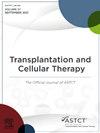儿童造血干细胞移植中照顾者经验的多中心研究第一部分:心理健康、社会心理压力源和支持机制的综合分析
IF 4.4
3区 医学
Q2 HEMATOLOGY
引用次数: 0
摘要
接受同种异体造血干细胞移植(HSCT)的儿童的护理人员在整个移植过程中面临着巨大的心理、社会和后勤挑战。这项多中心纵向定性研究探讨了49名护理人员在四个关键时间点(移植(0天)、30天、100天和180天)的心理健康经历、压力源和应对策略。参与者报告说,在这个过程的早期出现了严重的痛苦,由于医院环境的限制、高度警惕的护理要求、经济压力和家庭分离的情感损失,这种痛苦加剧了。随着护理过渡到门诊环境,挑战转向了复杂的家庭护理,管理挥之不去的不确定性,以及平衡其他家庭成员的需求。在整个过程中,护理人员表达了与担心复发、感染和长期并发症相关的高度焦虑。尽管有这些负担,许多护理人员描述了韧性的强大来源。孩子们的情感力量、诚实的沟通和回归正常生活的愿望有助于维持照顾者的乐观态度。来自医疗团队的支持、经济援助以及获得专业精神健康服务的机会进一步减轻了压力。护理人员强调需要改善住院环境,更清晰的门诊指导,结构化的心理健康资源和实用工具,如护理人员手册。这些发现强调了在儿童造血干细胞移植过程中需要全面的、以家庭为中心的护理,以解决护理的心理和实践层面。量身定制的、时间敏感的支持策略对于改善护理人员的福祉至关重要,反过来,在移植连续体中优化患者的结果。本文章由计算机程序翻译,如有差异,请以英文原文为准。
Multicenter Study on Caregiver Experiences in Pediatric Hematopoietic Stem Cell Transplantation Part I: Integrative Analysis of Mental Health, Psychosocial Stressors, and Support Mechanisms
Caregivers of children undergoing allogeneic hematopoietic stem cell transplantation (HSCT) face substantial psychological, social, and logistical challenges throughout the transplant journey. This multicenter, longitudinal qualitative study explored the evolving mental health experiences, stressors, and coping strategies of 49 caregivers interviewed across four key time points: transplant (d 0), d +30, d +100, and d +180. Participants reported acute distress early in the process, exacerbated by restrictive hospital environments, the demands of hypervigilant caregiving, financial strain, and the emotional toll of family separation. As care transitioned to the outpatient setting, challenges shifted toward navigating complex home care, managing lingering uncertainty, and balancing the needs of other family members. Throughout the process, caregivers expressed heightened anxiety related to fear of relapse, infection, and long-term complications. Despite these burdens, many caregivers described powerful sources of resilience. Children’s emotional strength, honest communication, and a desire to return to normal life helped sustain caregiver optimism. Support from the healthcare team, financial assistance, and access to professional mental health services further alleviated stress. Caregivers emphasized the need for enhanced inpatient environments, clearer outpatient guidance, structured mental health resources, and practical tools like caregiver handbooks. These findings underscore the need for holistic, family-centered care that addresses caregiving's psychological and practical dimensions during pediatric HSCT. Tailored, time-sensitive support strategies are essential to improving caregiver well-being and, in turn, optimizing patient outcomes across the transplant continuum.
求助全文
通过发布文献求助,成功后即可免费获取论文全文。
去求助
来源期刊

Transplantation and Cellular Therapy
Medicine-Hematology
CiteScore
7.00
自引率
15.60%
发文量
1061
审稿时长
51 days
 求助内容:
求助内容: 应助结果提醒方式:
应助结果提醒方式:


